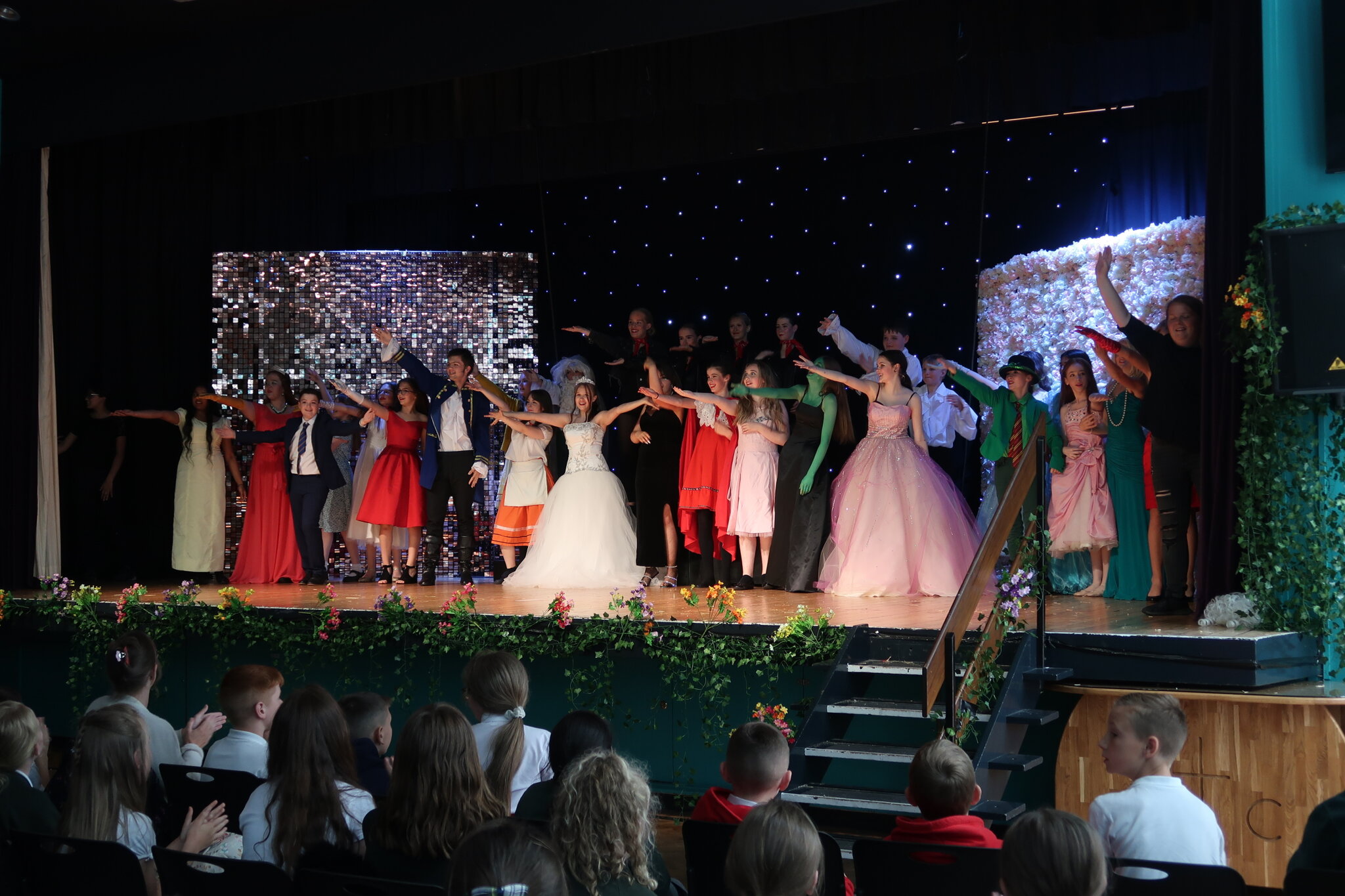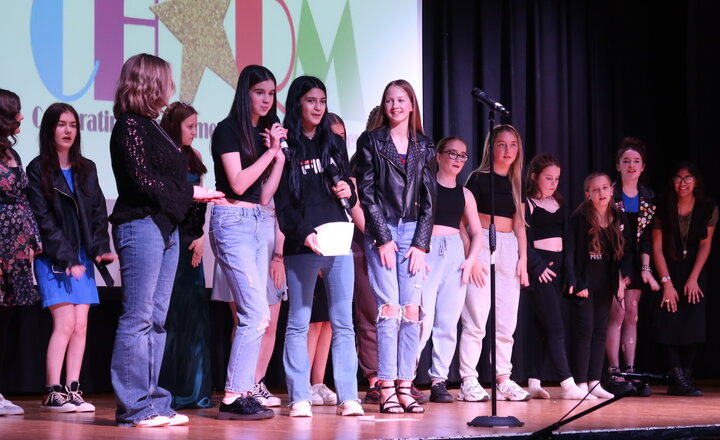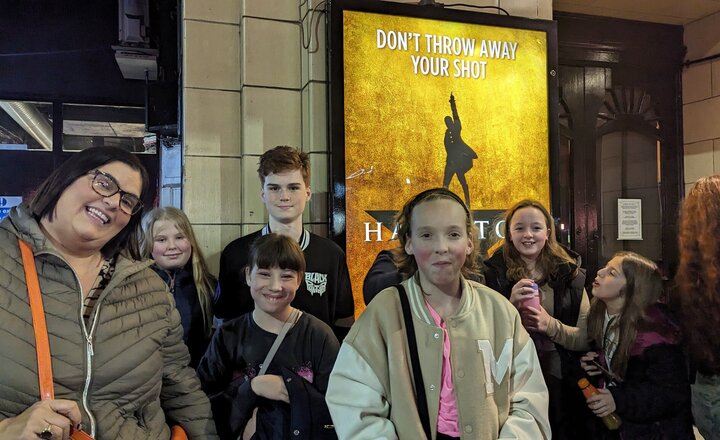“And he said to them, “Go into all the world and proclaim the gospel to the whole creation. Whoever believes and is baptized will be saved, but whoever does not believe will be condemned.” Mark 16:15-16
Vision
Performing arts is a broad curriculum area that allows students’ personal growth within a successful and ever-growing industry. The course delivers a range of knowledge and experiences connected to developing skills for performance, rehearsing, performing and production. Students are also encouraged to support their own learning with varied extracurricular activities such as choir, peripatetic lessons, joining the school play and are recommended to take advantage of live theatre events available in the local area.
Intent KS4
KS4 curriculum
At key stage 4, pupils work towards the Pearson BTEC award in Performing Arts.
This new course combines drama, music and dance and allows students to perform, learn production skills and discover more about careers in the performing arts sector. It gives them the opportunity to develop knowledge and technical skills in a practical learning environment.
How will the subject be assessed?
Students will complete three components:
COMPONENT 1: Exploring the Performing Arts
Levels: 1/2
Assessment type: Internal, externally moderated Guided learning hours: 36
Component in brief
Learners will develop their understanding of the performing arts by examining the work of performing arts professionals and the processes used to create performance.
Introduction
To develop in the performing arts, pupils need a broad understanding of performance work and influences. This component will helps pupils to understand the requirements of being a performer (in acting, dance or musical theatre) and/or designer (in lighting, props, costume, set, makeup or sound) across at least three performances and performance styles.
In this component they develop a practical understanding of how performing arts work is created. They look at elements such as roles, responsibilities and the application of relevant skills and techniques. They have the chance to explore practically the work of different professionals to develop an appreciation of the methods they use to explore
a theme and communicate to audiences through their work. They broaden their knowledge through observing existing repertoire and by learning about professionals’ approaches and how they create and influence performance material.
This component gives pupils an understanding of professional performing arts work and the processes and practices that contribute to the creation of a range of performance styles.
COMPONENT 2: The performance
Pupils develop their performing arts skills and techniques through the reproduction of acting, dance and/or musical theatre repertoire as performers or designers.
Introduction
Working as a performer or designer requires the application of skills, techniques
and practices that enable students to produce and interpret performance work. They will communicate intentions to an audience through a chosen discipline, such as performing or designing in any performance style from acting, dance or musical theatre.
In this component, they develop performing or design skills and techniques. They have the opportunity to specialise as a performer or designer in one or more of the following disciplines: acting, dance, musical theatre. They will take part in workshops and classes where they will develop technical, practical and interpretative skills through the rehearsal and performance process. They will work from existing performing arts repertoire, applying relevant skills and techniques to reproduce performance or design elements of the work.
Throughout their development, they will review their own progress and consider how to make improvements.
Developing performance or design skills and techniques will enable them to consider their aptitude and enjoyment for performing arts, helping them to make informed decisions about what they study in the future. This component will help them to progress to Level 3 qualifications in performing arts or production arts, which look at skills and techniques in more detail. Alternatively, they may want to progress to other Level 3 vocational or academic subject areas. This component has many transferable qualities, for example communication skills and teamwork, which will be valuable whatever they decide to do.
COMPONENT 3: Responding to a Brief
Levels: 1/2
Assessment type: External Synoptic Guided learning hours: 48
Component in brief
Pupils will be given the opportunity to work as part of a group to contribute to a workshop performance as either a performer or a designer in response to a brief and stimulus.
Introduction
Live performance can happen in a number of places and for a range of reasons.
For example, they may perform in a traditional performance space to an audience to communicate ideas about a particular theme or issue, or they may be part of a touring group that takes a performance to a community setting, such as a local school, to teach a young audience a safety message.
In this component, they will have the opportunity to respond to a brief. They will be given a brief that outlines the performance and design requirements and asks them to consider the target audience and to start the creative process by using the stimulus included in the brief. Working as part of a group, they will develop their ideas for a workshop performance and apply your skills and techniques to communicate their creative intentions to your audience.
The performance or design skills they will use will vary depending on features such as your selected performance discipline and the content of the work, venue and target audience. The work may involve improvisation, vocal work, movement techniques or assisting with audience involvement. The group performance may involve some solo
or small-group work or it may be an ensemble piece. They will have the opportunity to inform the performance using existing or newly developed skills in performing or designing and adapting them to suit the performance.
Enrichment and / or extra curricular activities
- Theatre trips/ backstage tour of theatre
- Choir
- Brass ensemble
- ‘MC’s got Rhythm’ – Djembe band
- ‘Ukulele group’
- School production
- CHARM
Impact
Next steps (College, University, career)
What can the subject prepare me for?
The course is designed to prepare learners for further qualifications in performing arts, drama, dance, music, media studies, film studies and art and design. In addition, learners will develop a broad knowledge of creative business practices, including functions and roles, marketing and event management. The following transferable skills are an integral element within the design of the technical award and are included within the subject content and assessment:
• Teamwork
• Communication
• Research
• Problem solving
• Design
• Planning and budgeting
• Self-appraisal
• Evaluation
• Leadership
• Presentation
• Literacy and numeracy skills
Additional resources:
AQA technical award in performing arts specification at a glance :
AQA technical award in performing arts course content:
https://www.aqa.org.uk/subjects/performing-arts/technical-award/performing-arts-3745/introduction
For design students and to help answer design based exam questions:
https://www.bbc.co.uk/bitesize/guides/z39x34j/revision/1
In order to write a theatre evaluation for unit 1 portfolio and unit 2 exam:
https://www.bbc.co.uk/bitesize/guides/zxs9xnb/revision/1
Performance space:
https://www.bbc.co.uk/bitesize/guides/z26bjxs/revision/1
Drama medium:
https://www.bbc.co.uk/bitesize/guides/zyr7fg8/revision/1
Drama elements:
https://www.bbc.co.uk/bitesize/guides/zqx3wmn/revision/1



